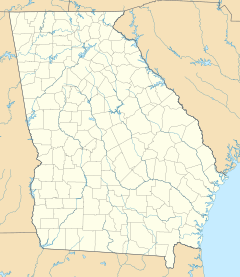- This page was last modified on 17 October 2025, at 10:18. Suggest an edit.
Autrey Mill Nature Preserve & Heritage Center facts for kids
| Autrey Mill Nature Preserve & Heritage Center | |
|---|---|
| Location | Johns Creek, Georgia, United States |
| Area | 46 acres (19 ha) |
| Established | 1989 |
| Governing body | Autrey Mill Nature Preserve Association |
The Autrey Mill Nature Preserve & Heritage Center is a special place in Johns Creek, Georgia, United States. It's a nature preserve and a heritage center all in one! You can find it at 9770 Autrey Mill Road.
Contents
Discovering Autrey Mill's Past
How Autrey Mill Was Saved
The city of Johns Creek, Georgia, owns Autrey Mill. But a group called The Autrey Mill Nature Preserve Association helps run it. This group started in 1987. A local hero named Margaret Krueger, with help from Judy Webb, wanted to save some land. Developers planned to build on 240 acres. This land included an old grist mill and its dam.
Another important person, John Ripley Forbes, also helped. He had started other nature places like the Chattahoochee Nature Center. Thanks to these efforts, a part of the land was saved.
The Land's Long History
Autrey Mill Nature Preserve covers 46 acres (about 18.6 hectares). It has a 2-mile (3.2 km) walking trail, a creek, gardens, and many animals. In 2006, experts found some cool things here. They discovered an old gold mine shaft and parts of the mill's foundations. They also found where the miller's house used to be.
This land was once home to the Cherokee people in 1755. Sadly, they were forced to leave their homes in 1830. They had to travel to Oklahoma on a difficult journey called the Trail of Tears. Later, the land was given to new settlers. It passed through several owners. Ransom Autrey owned the grist mill, which worked until the early 1900s. The last private owners, the Debray family, added many buildings in the 1970s.
Nature's Wonders at Autrey Mill
Trees, Plants, and Wildlife
The area around Autrey Mill is full of life! You can find 28 different kinds of native trees here. There are also 58 types of native plants, including the beautiful Pink Lady's Slipper orchid. Over 110 kinds of native wildlife live here too. Most of the preserve is covered by forest. It also has wetlands and a small river called "Sal's Creek."
Amazing Animal Collections
The Center has models of animals that live in Georgia. It also has many live insects, reptiles, and amphibians for you to see. Outside the Visitor Center, you can find rabbits, chickens, and ducks living in two pond areas.
Step Back in Time: Heritage Village
The Heritage Village is a collection of old buildings. Some were already on the land, and others were moved here to be saved.
- The Visitor Center
- The Farm Museum
- The Summerour House
- The Green General Store
- The Delco Remy Building
- The Warsaw Church
The Visitor Center and Farm Museum
The Visitor Center is one of the oldest buildings on the site. It was built around 1860 as a tenant farm house. The Debray family added rooms to it in the 1970s. Today, it holds staff offices and displays live animal exhibits. The Debrays also added a carriage house, which is now the Farm Museum. They fixed up a 1940s barn, which is now a teaching center.
Historic Homes and Stores
Many old buildings were moved to Autrey Mill to protect them from being torn down.
- The Summerour House: This Victorian-style farmhouse was built in the 1880s. It belonged to the Summerour family, who were big landowners. They grew a special kind of cotton. The house was moved to Autrey Mill in 1992. A small two-room tenant house from the farm also came with it.
- The Old Warsaw Church: This church started as a campground in 1822. A church building was put there in the 1860s. In 2004, it was moved to Autrey Mill and fixed up in 2008.
- The Green General Store: This store was built in the 1920s and closed in the 1940s. It was moved to Autrey Mill in 2004. It also came with its small Delco Remy generator building, which gave the store power.
Treasures from the Past: Heritage Collections
Autrey Mill has many historical items in its buildings.
- Summerour House and Tenant Farm House: These houses have furniture, kitchen items, and photos from the early 1900s. You can see things like butter churns, chamber pots, laundry washboards, and a cast iron stove.
- Farm Museum: This museum shows tools used by early farmers. You can see a doctor's buggy, a pea sheller, scythes, ploughs, and items for horses.
- Green Store: This store has the biggest collection! It includes items sold in the store, like glass soda bottles. You can also see old store ledgers, war souvenirs, and original signs.
- Warsaw Church: The church has its original sign and plaques on the pews. These plaques remember families who belonged to the church.
- Visitor Center: This center holds the live animal collection. It also has natural history exhibits, including the Forsten Native American Exhibit.
Native American History
Near the Forest trail entrance, there used to be models of a 17th-century Native American hunting lodge and a wooden tipi. These were built by Tom Blue Wolf and his team. A replica Native village opened in 2008. (These structures were removed in February 2024.)
Inside the Visitor Center, you can see a small exhibit of the Forsten collection. The Forsten family donated this collection in 2011. It has almost 300 pieces of Southeastern American Indigenous artifacts. These include projectile points, gorgets, and atlatl weights.







